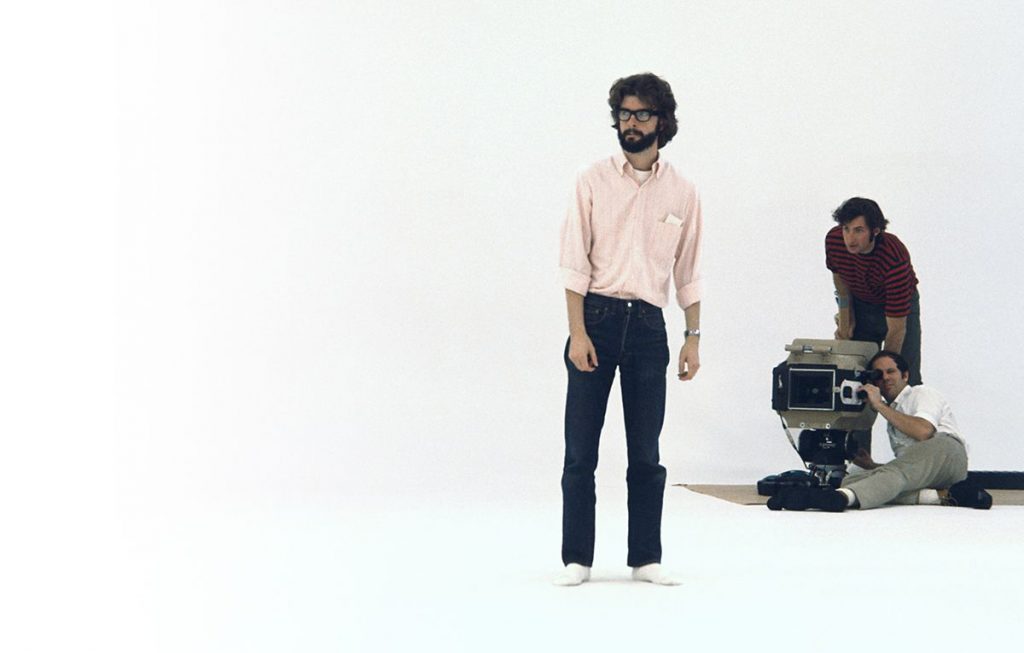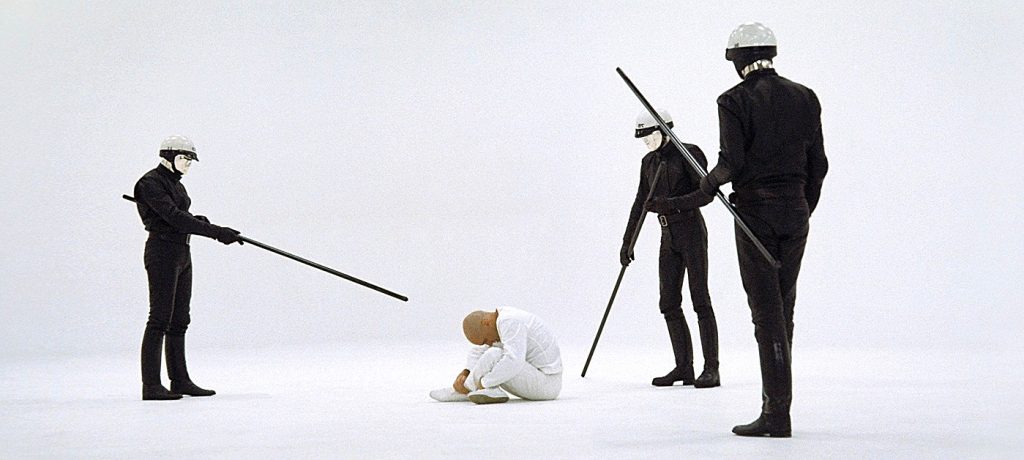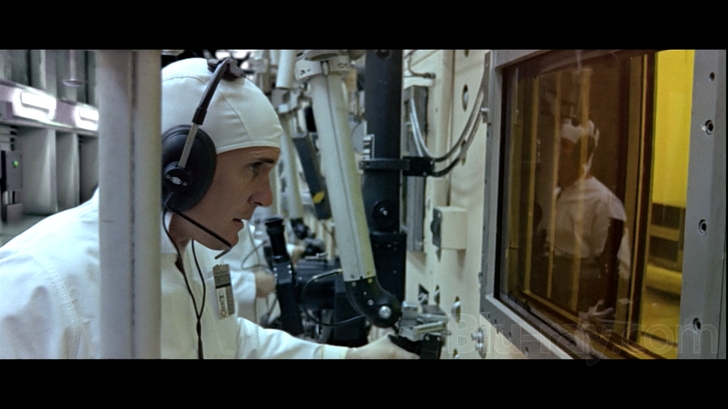“You are a true believer, blessings of the State, blessings of the masses. Thou art a subject of the divine, created in the image of man, by the masses, for the masses.”

These are the salutations of OMM, a state-sanctioned deity whose visual representation is Hans Memling’s Christ Giving His Blessing. OMM’s full name is OMM 0910, and it/he/they reside on the wall of a space vaguely similar in appearance to a telephone booth, complete with the accordion-style glass doors. Visitors can enter to confess and vent about their daily lives. OMM 0910 listens to every word you say, interjecting with phrases like “my time is yours,” “I understand,” and “could you be more specific?” When the visitor is finished sharing whatever is on his or her mind, OMM delivers eerie words that are intended to sound optimistic. “Work hard, increase production, prevent accidents and be happy.” “Let us be thankful we have commerce. Buy more. Buy more now. Buy. And be happy.”
No, these aren’t the results of a fever dream, and no, this isn’t the basis for a new religion in the same vein as The Flying Spaghetti Monster. This is just one of the many concepts introduced in George Lucas’ first feature film, THX 1138 (1971) [link no longer active]. The inspiration for THX came from a short film that Lucas created while he was a student at USC in 1967, which garnered enough praise for a full-length film produced by Francis Ford Coppola and starring Robert Duvall.
The plot is a simple one: in a tightly-controlled futuristic society, a man and a woman attempt to break free from the grip of their overseers and seek an uninhibited life. THX 1138 (Robert Duvall) is a worker in a factory that produces what can only be described as literal “robocops,” while LUH 3417 (Maggie McOmie) and SEN 5241 (Donald Pleasence) work as surveillance operators who study footage taken from the countless security cameras that are scattered throughout the city. In this society, sex is forbidden, efficiency is highly desired, compliance is essential, and everyone sports shaved heads and white outerwear to stress equality and remove any sense of individualism. All workers take state-mandated drugs and sedatives to suppress carnal desires, and any motivation to challenge the status quo. Those in power are rarely seen in the film, and rules are enforced by the very same robocops these workers are producing.
THX and SEN are roommates, and SEN begins to secretly change both her medication schedule and that of THX. What follows is a series of repercussions resulting from their “sober” behavior; SEN and THX have sexual intercourse, and THX makes a mistake during a critical moment in the robocop manufacturing process that leads to his arrest.

I won’t spoil too much, but I couldn’t help but compare the film’s overall look to that of the famous Apple Computers “1984” advertisement featuring the sledgehammer-wielding woman. Both the ad and Lucas’ film have countless bald workers wearing identical outfits, both have organized walks and marches from point to point, both have hologram/video displays that serve as the faces for hose in charge of society, and both have comical security officers with outfits that look like they were ripped out of CHiPs. If only that theme song carried over to Lucas’ film.
You can clearly see the influence that THX 1138 had on George Lucas’ later movies. Certain special effects look similar to those found in the first Star Wars film, and you can even hear a voice on a car radio say “I think I ran over a wookiee back there on the expressway” (Lucas would later use this word to name the race of woodland creatures that Chewbacca belongs to). Most of his films have subtle references to the film’s titular character, including cell blocks, Star Wars droids, automotive license plates, and Jedi training programs with names that are variations of THX 1138.
The acting in the film works in the context of the character’s predicaments. Robert Duvall does an excellent job portraying an individual experiencing drastic shifts in his environment and personality. From being heavily sedated, to going into withdrawal, to finally experiencing what it’s like to think and act as an individual rather than a cog in a machine, he takes the viewer on an emotional ride as he attempts to find LUH 3417 and escape to, well…anywhere but there. Just be aware that you’ll be viewing quite a few extreme close-ups, a lot of consternated faces, and a few scenes with nudity.
There are frequent moments of comic relief (despite the heavily anti-authoritarian plotline), and I feel like they deserve their own section for this review. George Lucas hired San Francisco improve troupe “The Committee’ to serve as the voices behind many of the faceless people that talk over the PA system, including the aforementioned state-sanctioned deity that is as relatable as Apple’s Siri. Every bedroom has a medicine cabinet behind the bathroom mirror that speaks to the worker, and the voice is just as enlightening as OMM 0910:
“If you feel you are not properly sedated, call 348-844 immediately. Failure to do so may result in prosecution for criminal drug evasion.”
“Take four red capsules. In 10 minutes, take two more. Help is on the way.”
“What’s wrong? – What’s wrong? – What’s wrong? – What’s wrong? What’s wrong? – What’s wrong? – What’s wrong? – What’s wrong?”
There are also some awesome one-liners from the PA system that broadcasts throughout the city:
“That accident over in Red Sector L destroyed another 63 personnel, giving them a total of 242 lost to our 195. Keep up the good work and prevent accidents. This shift is concluded.”
“Changeable. Alterable. Mutable. Variable. Versatile. Moldable. Movable. Fluctuate. Undulate. Flicker. Flutter. Pulsate. Vibrate. Alternate. Plastic.”
“Keep causeways clean. Save time, save lives.”
“Economics make it necessary to terminate any operation which exceeds five percent of its primary budget. Remember, thrifty thinkers are always under budget.”
“A libido leveler has been mislaid near the pulse-leveling gate. If you have accidentally…”

I could go on and on. While the film itself looks dated, the combination of the eerie music score and the frequent interruptions of the ridiculous PA system made this society feel particularly surreal. For a significant portion of the film, the audience is treated to a completely white atmosphere lacking any walls, corners, or recognizable sources of an “end” to the endless space. Within it, there are characters who have been imprisoned for various transgressions against the state, and their situation is very similar to that of the patients who are in the ward in One Flew Over the Cuckoo’s Nest.
It’s hard to give this film a specific “score,” if I were to try and be a “proper” reviewer. There are better sci-fi plots out there, and the action is limited by the era in which this was filmed. With that being said, I think that any fan of the genre should watch THX 1138 if only to see the foundation on which countless blockbuster films were built upon. If you have 90 minutes to kill and want to watch a dystopian vision of the future from the lens of 1971 America, definitely check this out (and then watch George Lucas’ second film, American Graffiti, which is awesome).



